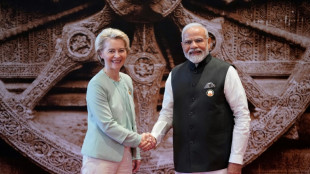
-
 Indonesia agrees deal with Apple that could end iPhone sales ban
Indonesia agrees deal with Apple that could end iPhone sales ban
-
Global stability threatened by backslide in cooperation: S.Africa

-
 'Sorry I couldn't protect you': Israel mourns Bibas mother, sons
'Sorry I couldn't protect you': Israel mourns Bibas mother, sons
-
BP ditches climate targets in pivot back to oil and gas

-
 EU seeks to balance business needs, climate goals
EU seeks to balance business needs, climate goals
-
Stock markets rally with tech in focus

-
 BP to up oil and gas output, slash clean energy spend in overhaul
BP to up oil and gas output, slash clean energy spend in overhaul
-
Los Angeles wildfires costliest in history: Munich Re

-
 'Brat' icon Charli XCX picks up Brit award for best songwriter
'Brat' icon Charli XCX picks up Brit award for best songwriter
-
AB InBev posts record sales in 2024 despite beer volumes slipping

-
 Aston Martin cuts jobs as weak China demand weighs
Aston Martin cuts jobs as weak China demand weighs
-
Stellantis says 2024 profits fall 70% on N. America troubles

-
 'Joyful' South Koreans hope rising births will continue
'Joyful' South Koreans hope rising births will continue
-
Indonesia agrees deal with Apple that could end iPhone sales ban: reports

-
 US says Gaza ceasefire talks on track
US says Gaza ceasefire talks on track
-
Tech surge helps Hong Kong lead most Asian markets higher

-
 Hong Kong to slash public spending, build AI institute
Hong Kong to slash public spending, build AI institute
-
Israelis mass for funeral of Bibas hostages killed in Gaza

-
 Most Asian markets rebound as Hong Kong tech rally resumes
Most Asian markets rebound as Hong Kong tech rally resumes
-
Under pressure, EU to take axe to green rules

-
 Shunned by US, Europe courts India over trade and security
Shunned by US, Europe courts India over trade and security
-
BP to unveil strategy shakeup amid energy transition

-
 Private US company set for second Moon landing attempt
Private US company set for second Moon landing attempt
-
New cocktails shake up Oscar night

-
 Leading rare earths miner sees profits fall as prices sag
Leading rare earths miner sees profits fall as prices sag
-
Tesla sinks below $1 tn market value as European auto sales slump

-
 Paint them white: how Brazil is keeping trains on track
Paint them white: how Brazil is keeping trains on track
-
Japan's ANA to purchase mega-order of 77 new jets

-
 US hardens visa sanctions over Cuba medical program
US hardens visa sanctions over Cuba medical program
-
'A normal family', says son of surgeon in French sex abuse trial

-
 Stocks slide as US consumer confidence tumbles, tech slumps
Stocks slide as US consumer confidence tumbles, tech slumps
-
Germany's next leader grapples to boost defence spending

-
 Stock markets shrug off Trump trade war fears but tech sags
Stock markets shrug off Trump trade war fears but tech sags
-
UK PM pledges to spend 2.5 percent of GDP on defence by 2027

-
 'Matter of survival': Nations spar over nature funding at UN talks
'Matter of survival': Nations spar over nature funding at UN talks
-
German family-run machine maker issues SOS to future government

-
 Stock markets struggle on fears over Trump's China tech curbs
Stock markets struggle on fears over Trump's China tech curbs
-
Indonesia agrees to terms with Apple to lift iPhone sales ban: source

-
 Chance huge asteroid will hit Earth down to 0.001 percent
Chance huge asteroid will hit Earth down to 0.001 percent
-
Unilever boss to step down after less than two years at helm

-
 Kate Bush leads UK musicians in 'silent album' AI fight
Kate Bush leads UK musicians in 'silent album' AI fight
-
Hein Schumacher to step down as Unilever CEO

-
 Countries lock horns over cash for nature at rebooted UN talks
Countries lock horns over cash for nature at rebooted UN talks
-
Tesla rolls out advanced self-driving functions in China

-
 Asian markets sink as Trump tariffs, China curbs stunt rally
Asian markets sink as Trump tariffs, China curbs stunt rally
-
Trump calls for revival of Keystone XL Pipeline project axed by Biden

-
 Stuck in eternal drought, UAE turns to AI to make it rain
Stuck in eternal drought, UAE turns to AI to make it rain
-
Latin American classics get the streaming treatment

-
 Fires, strikes, pandemic and AI: Hollywood workers can't catch a break
Fires, strikes, pandemic and AI: Hollywood workers can't catch a break
-
Bolivia inaugurates steel plant built with Chinese loan


'Joyful' South Koreans hope rising births will continue
South Koreans rejoiced Wednesday at news that the number of births had risen for the first time in about a decade -- a rare bright spot for a country facing a deepening demographic decline.
South Korea's statistics office earlier in the day announced that the country's fertility rate, or the average number of babies a woman is expected to have in her lifetime, was 0.75 last year.
It's only a small uptick from the year before -- and still far below the figure of 2.1 needed to maintain South Korea's population of 51 million.
But approached by AFP on the bustling streets of Seoul, many saw the rising fertility rate -- for the first time since 2015 -- as a positive step in the right direction.
"The news of the birth rate rebounding after nine years is incredibly joyful for me," said Jun Sang-pill, a 34-year-old office worker.
Housewife Park Ye-jin, 41, said her child had recently finished elementary school -- along with only 99 other students.
That, she explained, was only a fifth of the kids in her graduating class when she was that age.
"The graduation ceremony felt quite empty, and I felt sad," she told AFP.
Nearby, on its vast electronic screen, Seoul's National Museum of Korean Contemporary History displays adverts from the country's presidential committee on population policy -- a government body set up in 2023 to find ways to reverse the declining birth rate.
Seoul has poured billions of dollars into efforts to encourage women to have more children and maintain population stability.
Experts say there are multiple reasons for the low birth rate, from high child-rearing costs and property prices to a notoriously competitive society that makes well-paid jobs difficult to secure.
- 'Disappearing' country -
And state efforts had so far failed to boost the birth rate -- sparking increasingly dire predictions about the fate of the country.
"With the birth rate dropping like this, there were even talks about the possibility of South Korea disappearing," housewife Park said.
Some online were not as positive about the news.
"South Korea's birth rate is not just the lowest among OECD countries but it is still the absolute lowest. Please do not distort the facts," the top comment on the country's largest internet portal read.
"First increase in nine years!" another wrote on Threads.
"South Korea's birth rate graph looks like a bitcoin chart now."
Office worker Jun was more optimistic.
"I hope that this rebound will be the starting point for a continuous increase in South Korea's birth rate in the future," he said.
And Park expressed hope that "graduation ceremonies will feel fuller" in the future.
"I believe those empty schoolyards and classrooms can be filled with the sound of children's laughter," she said.
"It makes me really happy."
U.Ndiaye--CPN
